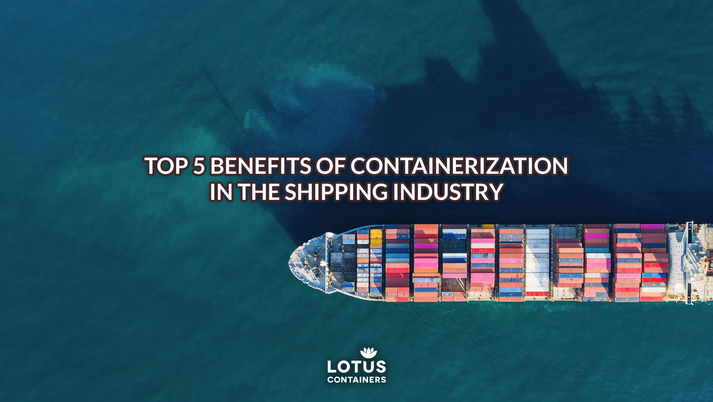The shipping industry is the backbone of global trade. With the development of technology, we are now experiencing faster transit, quick delivery, and budget-friendly shipments. How did we come so far from transporting cargo by horses and carts to transporting them via ships, rails, and trucks? Containerization in the shipping industry has made this process simpler and more practical over the years, and in this blog, we will explore its benefits in the shipping industry.
What is containerization in the shipping business?
Back in the 19th century, when cargo was delivered in sacs, bags, and different packaging structures, it was prone to damage over long distances. With modern technologies, loading cargo onto ships and shipping it across borders has become simpler. Containerization gained popularity as an efficient means of intermodal transportation. It is a method of loading cargo containers and moderating their transit till they reach their destination port. Technology-enhanced containerization offers constant oversight and management of shipping containers to lower the risk of cargo damage.
Why is containerization in the shipping industry a global demand?
The shipping industry is overflowing with different types of shipping containers suitable for loading bulk and non-bulk cargo. Containerization enables proper packaging and stuffing of shipment into containers of appropriate sizes. These containers are insured, and the container leasing or selling company is responsible for managing and repairing them. Containerization, therefore, is a cost-effective, reliable, and profitable solution for trade.
The History of Containerization
Shipping containers have been around since the 1950s when the first container ships were introduced. By enabling heavy cargo’s swift and effective movement, these ships transformed how products were carried. The innovation by Malcolm McLean revolutionized the arena of intermodal transport. Since then, shipping containers have become a global demand for all shipments- road, rail, air, and ocean. Therefore, containerization in the shipping industry has significantly transformed trade by transporting 90% of manufactured goods globally.
Intermodal Transportation with containerization
When shipping hundreds of kilometres, especially internationally, the goods might be carried via two or more modes of transportation. Packing cargo into intermodal containers enables seamless switching of transport modes during the movement of goods. Containerization is a time-saving, cost-effective method that assures on-time tracking and cargo delivery.
Top 5 Benefits of Containerization in the Shipping Industry
The globally growing demand for containerization among customers and stakeholders is due to its myriad benefits. Let’s take a look at a few of them.
- Efficiency and Versatility: Technology has made the shipping process cost-effective and feasible. Reduced manual labour and lower damage risks help cut costs and increase profitability. With intermodal transport, containerization offers versatility through multiple modes of transport. Once loaded in containers, the consumer or stakeholder can ship the cargo through any desired method.
- Fast Delivery: Containerization has reduced the risk of damage and, as a result, ramped up and simplified the delivery of goods. With fully integrated advanced technologies, the shipping time has been cut down to half. Packaging, loading, and paperwork that are well-organized saves time. Shipping routes support international trade by offering quick sailing times and preparing for incoming traffic to reduce congestion.
- Easy Management and Transparency: Since the administration of the shipping containers is the responsibility of the businesses that offer container shipping services, they are simple to handle. The repair and management of container fleets are totally up to the container leasing companies. Handled through IoT and AI technologies, containerization allows greater transparency and transit visibility of cargo containers. The number of trips required to carry cargo can be decreased by containerization, which may reduce carbon emissions.
- Guidelines and Security: Container ships are checked for documentation and clearances by customs at ports or container depots. If they fail to produce them, it leads to delays in transit and heavy fines. The procedure complies with legal and regulatory requirements to transfer cargo without difficulty. If everything is legal, it is secure. Containerization provides absolute safety and allows for easier tracking of cargo, which can improve the overall supply chain.
- Reliability: Containerization reduces intermediate or third-party involvement, resulting in quality packaging and delivery. In cases of tampering or theft from cargo, the sender is alarmed through the mobile app. The cargo is responsibly always handled to cut down risks of damage.
How did Containerization change the Shipping Industry?
After the outbreak of containerization, the logistics and transport industry witnessed massive growth. It improved the reputation of the trade industry. Customers and stakeholders began making smarter investments, ensuring profitable outcomes. It led to the global expansion of the trade industry, enhancing the country’s economy and building foreign relations. The management and functioning of shipping ports improved as containerization moderated cargo stuffing processes, reducing port congestion and waiting time. Insurance and controlled monitoring of the transit process offers low-risk damage to goods upon reaching destination ports. Cost-effective in nature, containerization has acted as a catalyst leading to the vast and continuous expansion of the global supply chain.
Containerization has been making major economic shifts in the past decades, leading the globalization march to bring revolutions in the trade industry. If you are thinking of investing securely and more reliably, consider the benefits of containerization in the shipping industry.
LOTUS Containers aim to offer shipping container solutions across the globe by providing cost-effective, durable, and secure shipping container services. We also provide maintenance and repair services to keep shipping containers in good shape and ready for use.




